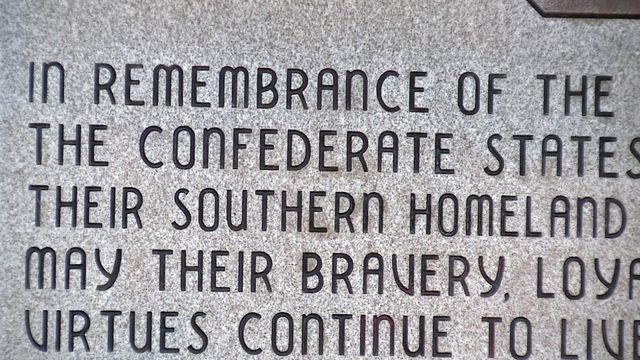From county and road names to statues, dozens of Confederate monuments in NC
Confederate monuments have been flashpoints for controversy in North Carolina in recent years, and NASCAR's decision this week to ban the Confederate flag from races is once again shining the light on the divisive issue.
Posted — UpdatedAccording to the Southern Poverty Law Center, there are at least 1,700 Confederate symbols in public places in the United States. About 10 percent of them are in North Carolina – only Virginia, Georgia, South Carolina and Texas have more Confederate symbols.
The anti-discrimination group researched databases and accepted public submissions of Confederate symbols to come up with its data.
In North Carolina, there are now 96 monuments and 63 highways or roads named after Confederate leaders. New Hanover County, which was home to the Wilmington race riots in 1898, has the most Confederate symbols at 35. Wake County is next with nine, followed by Rowan County with eight and Cumberland and Mecklenburg counties at seven each.
The SPLC found Confederate dedications started at the end of the Civil War but spiked in early 1900s as Southern states enacted Jim Crow laws and again in the 1950s and 1960s during the Civil Rights movement. The last Confederate monument dedicated in North Carolina was in Mitchell County in 2011.
Other symbols called out by the SPLC include the North Carolina Veterans Forest in Haywood County, Fort Bragg and the Sons of Confederate Veterans commemorative license plate. Four counties in North Carolina are also named after Confederate leaders: Hoke, Lee, Pender and Vance. Also, two Confederate holidays are still listed in state statues: Robert E. Lee’s birthday on Jan. 19 and Confederate Memorial Day on May 10.
Not on the SPLC list are Stonewall Drive and Rebel Circle, which intersect in north Raleigh. Longtime resident Stacey Smith said the names don’t bother her.
"Actually, I think it’s a cool name. It preserves the people who started this community," Smith said.
Wake Coutny tax records show the homes along Stonewall Drive and Rebel Circle were built in the late 1960s and late 1970s.
Smith, who has lived there for 50 years, said people can’t keep living in the past.
"We can’t keep looking back at what’s happened because what’s done has been done, and you can’t unscramble eggs," she said.
Gerald Givens, president of the Raleigh-Apex NAACP, doesn’t see it that way. He finds Confederate statues and street names offensive.
"I understand America will never overcome white supremacy if it keeps protecting it, if it keeps honoring it," Givens said, adding that the nation "without a doubt" is still fighting the Civil War.
"Until we reconcile what happened in our past, we’ll never be able to solve the problems that we have in the present and be able to lay a stronger foundation for our country and its future," he said.
Despite defending the Confederate symbols, Smith agreed the nation needs to heal. "People are hurting right now. We need to come together – united we stand," she said.
Related Topics
• Credits
Copyright 2024 by Capitol Broadcasting Company. All rights reserved. This material may not be published, broadcast, rewritten or redistributed.






